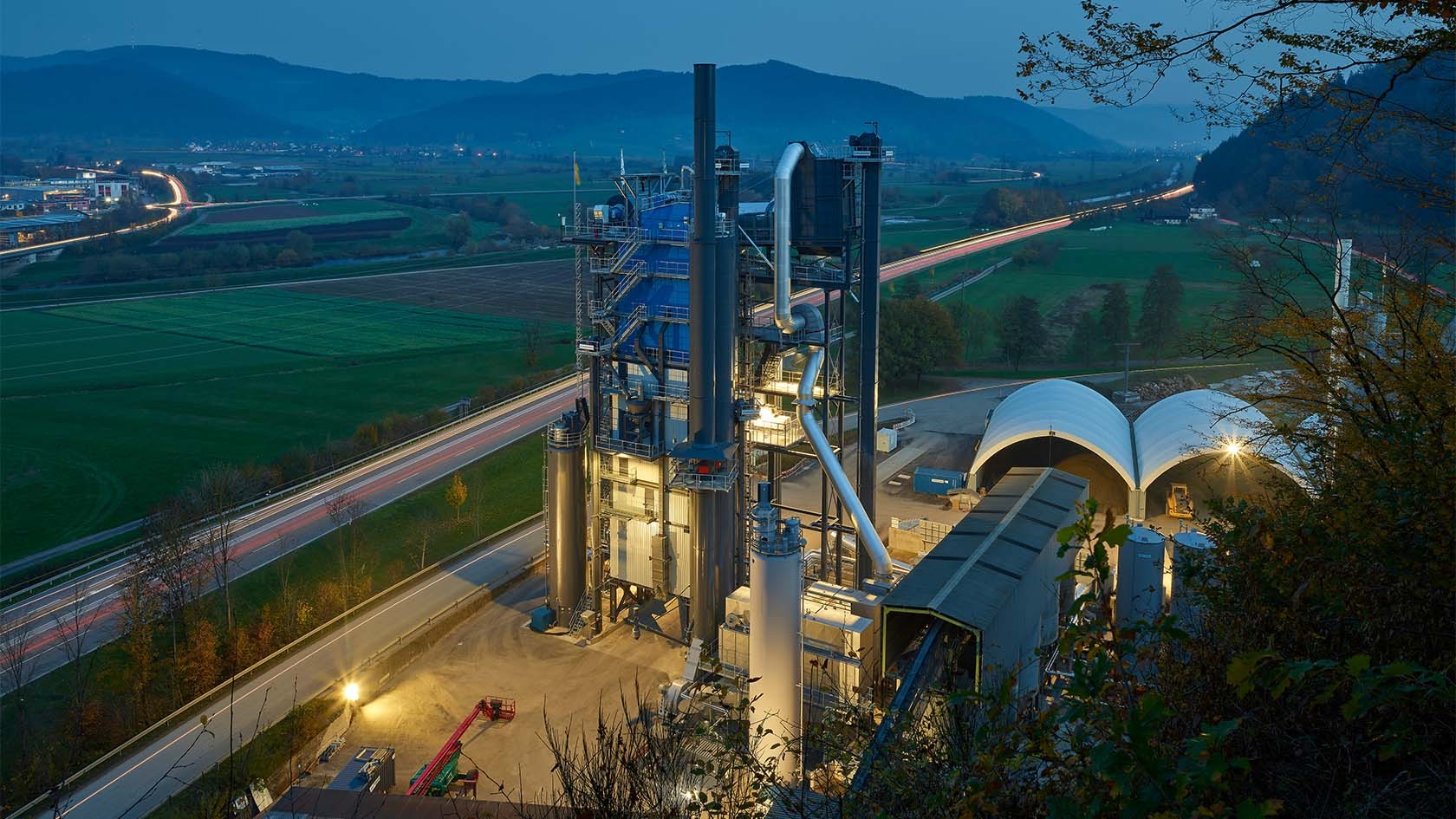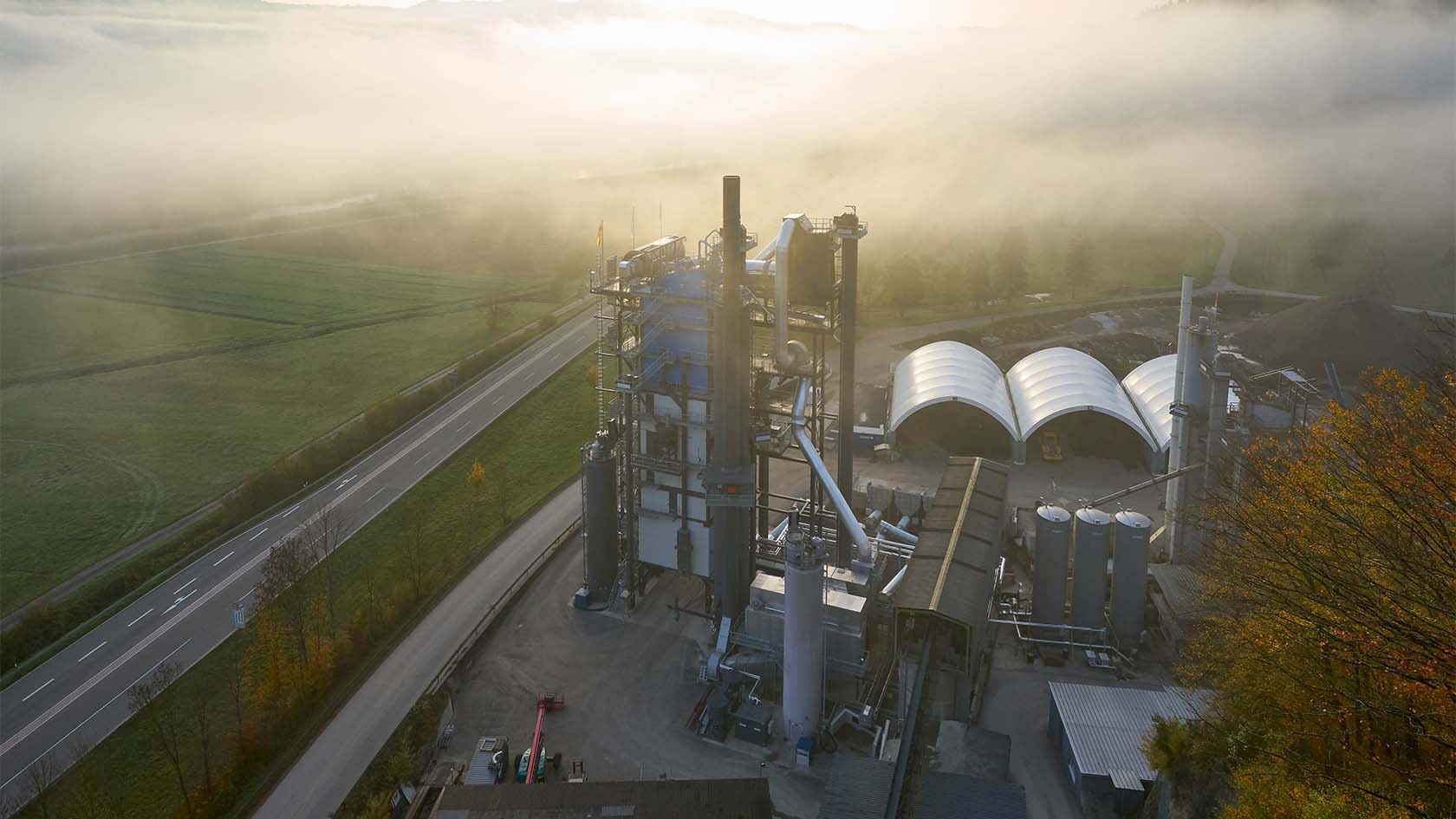Benninghoven RPP 4000 asphalt mixing plant at Knäble


New Benninghoven RPP 4000 has already produced asphaltic mixtures with 96 % reclaimed asphalt
At Benninghoven, recycling priority plants (RPP) are plants that are designed primarily for producing asphalt with a high content of recycled material. By integrating a hot-gas generator – the leading recycling technology of Benninghoven, customers can meet the highest requirements for low-emissions operation while producing fresh asphaltic mixtures from up to 90 + x % reclaimed asphalt. That is more than with any other recycling system on the market, and with convincing benefits for the owners, as an example from southern Germany impressively demonstrates.

Producing asphalt based on virgin mineral is already a challenging task that requires perfectly coordinated plant technology. But if the new mixture is to be made up primarily of reclaimed asphalt and milled material, the Benninghoven hot-gas generator technology is practically a must. It helps owner to turn 100 % of the reclaimed asphalt into new asphaltic mixtures while complying with the strict requirements of the new German TA-Luft emissions directive. An RPP 4000 at the medium-sized construction firm Knäble GmbH Straßenbau in Biberach (Baden) has been proving that this is possible for some time.
A drive along national highway 33 through the Kinzig Valley in the Black Forest offers a stunning sight on the approach to the municipality of Biberach: A new, state-of-the-art Benninghoven plant of type RPP 4000 with a total height of 55 m comes into view. The new asphalt mixing plant at the medium-sized construction firm Knäble GmbH Straßenbau from Biberach (Baden) is special for various reasons. The RPP 4000 replaces a TBA 3000 plant which reliably produced the asphaltic mixture for the two Knäble asphalt crews for ten years – quite a short period for an asphalt mixing plant. Most Benninghoven plants have a life cycle of 30 to 40 years.
So why did the long-standing road construction company invest in new equipment instead of a retrofit solution, for example? “A retrofit was indeed the starting point of our planning. In our region, several companies recently invested in their plants – the market environment is very dynamic. Together with our contacts at Benninghoven, we weighed up the pros and cons of different technical solutions. The result was that new technology will allow us to meet our requirements regarding recycling, quality and capacity much more effectively and will be more future-proof – so we chose the new Benninghoven plant,” explains Nicolas Knäble, fourth-generation Managing Director. “Another reason for us to choose Benninghoven technology was that there is a great focus on recycling in road construction here in the state of Baden-Württemberg. In addition to this, we are a company that wants to protect our planet’s natural resources, meaning we want to use as little virgin mineral and bitumen as possible while increasing the reclaimed asphalt content to achieve the maximum possible recycling rate.”
“We are a company that wants to protect our planet’s resources.”
Nicolas Knäble, Managing Director of Knäble GmbH Straßenbau
The Benninghoven recycling drum technology uses counterflow action in the hot-gas generator: The burner fires into the hot-gas generator and intensively heats the circulating air. This hot air then heats the recycling material in the recycling drum, in an indirect process that is gentle on the material. The material is heated to its final temperature and conveyed to the storage silos and from there to the mixer.
The investment is a great strategic step for the medium-sized road construction company. The leading recycling technology – the Benninghoven hot-gas generator – can turn 100 % of reclaimed asphalt into new asphaltic mixtures. This allows Knäble to meet the requirements for maximum recycling, i.e. making full use of the legally permissible amounts of reclaimed asphalt that can be added when producing new asphaltic mixtures in the state of Baden-Württemberg. “Re-using materials saves energy and is an important contribution to climate protection,” says State Minister of Transport Winfried Hermann. This measure has already resulted in Baden-Württemberg recycling 2.5 million tons of asphalt in 2018 – far more than the national average.
In addition, the revised German Technical Directive for Air Pollution Control (TA-Luft) was adopted at the end of 2021. “The strict limits defined in this directive can be met with the hot-gas generator technology, which Benninghoven guarantees in all capacity ranges and even with high recycling rates,” stresses Steven Mac Nelly, Head of Research and Development at Benninghoven. “This makes the RPP plants ideal for the requirements at Knäble.” As already mentioned, RPP stands for recycling priority plant, i.e. a plant that prioritizes the recycling material flow and primarily produces asphalt with a higher content of recycled material.
“Benninghoven guarantees compliance with the strict TA-Luft directive.“
Steven Mac Nelly, Head of Research and Development at Benninghoven
“As a modern company, we support the strict legal requirements, because we want to be progressive,” Nicolas Knäble clarifies. “We have also set ourselves the target of recycling as much asphalt as possible. And with our new plant, we have no problems meeting the requirements. This all works perfectly with the Benninghoven equipment.” For the total carbon values (Ctot), the RPP 4000 from Knäble achieves values far below the defined limits. “It is a good feeling that the plant runs so cleanly while still allowing us to deliver first-rate mixtures to the construction sites,” says Nicolas Knäble, who still sees many other opportunities in asphalt recycling for the future: “When working with a technology like this, of course you try to increase the recycling rate every year and to save even more resources.”
“We have set ourselves the target of recycling as much asphalt as possible. And with our new RPP 4000, that is no problem at all.”
Nicolas Knäble, Managing Director of Knäble GmbH Straßenbau
“We have already reached 96 % when producing base course mixtures. The final quality is perfect,” reports Nicolas Knäble. “The days when processing reclaimed asphalt was a challenge are a thing of the past. Instead, we now have to make sure that we regularly get large milling or resurfacing jobs so we can reclaim the raw material for producing recycling mixtures and do not run out of this ‘black gold’”.
The RPP 4000 not only integrates the sustainable hot-gas generator recycling technology, but also increases the mixing capacity. “Our new plant is an RPP 4000 with a 4 t mixer for a production capacity of 320 t/h,” says Nicolas Krähe. With the previous plant, his company was only able to produce 240 t/h of asphalt. “That is almost the capacity of our new hot-gas generator alone, which can heat 220 t/h of asphalt and add this to the process.”
Ready for large projects and storing different recipes: The RPP 4000 can produce 320 t of asphaltic mixture per hour – and store 440 t in the mixed material silo with four chambers.
Many other components are also designed to increase capacity and efficiency. “The configuration of the RPP 4000 also includes two EVO JET 3 multi-fuel burners – one for the virgin mineral dryer drum and one for the recycling drum, which can burn natural gas in addition to oil or coal dust with high efficiency. This will allow Knäble to flexibly react to market fluctuations in energy prices and always use the cheapest fuel,” explains Steven Mac Nelly from Benninghoven.
Investing in the future
All these aspects work together to make the new asphalt mixing plant a true investment in the future for Knäble. The long-standing, family-run company from the central Black Forest region has around 150 employees. Two in-house asphalt crews process most of the produced asphaltic mixture at road construction sites in the region, using Vögele material feeders and road pavers as well as Hamm compactors. A Kleemann screening plant and Wirtgen milling machines complete the fleet.
Knäble GmbH Straßenbau resurfaced the binder and wearing courses of a 3.2 km long section of the L 98 near Kehl in only twelve days. A number of machines from the Wirtgen Group were used, including the recently acquired Vögele road paver SUPER 2100-3i and Hamm compactors. The asphalt mixture was of course produced with the new Benninghoven RPP 4000 plant owned by Knäble.
High recycling rates with low emissions can only be achieved with the counterflow action in the hot-gas generator. The reason: Because the used asphalt is heated, the virgin mineral does not have to be overheated when it is added to the mixing process to achieve the required temperature level, which is between 140 °C and 180 °C for warm asphalt. This means that the process reduces emissions while also saving a lot of energy.
This process is made possible by the use of the Benninghoven hot-gas generator: While direct firing would tend to “burn” the recycling material coated with bitumen, the hot-gas generator simply heats it indirectly to gently raise it to the optimum application temperature. At the same time, the process lowers the emissions below the level required by the TA-Luft directive – for example with thermal treatment of a large part of the hydrocarbons contained in the exhaust gas flow. Continuous emissions measurements on the stack of the Knäble plant are used to monitor compliance with the legal limits in real time. “Compared to our previous plant, our average recycling rate has increased from 25 % to 60 %,” Myriam Knäble, wife of the Managing Director, reports proudly. “And with the new technology, we save around 770 t of CO2 per year compared to the previous plant.”
This is an enormous advantage, considering the CO2 prices in Germany – the market where Knäble is active. Due to recent changes, energy suppliers of fuels (except bio fuels) now have to purchase emissions allowances, also known as CO2 certificates. The costs incurred by this are increasing every year and are passed on to the customers. Companies who focus on energy efficiency and operate environmentally friendly and with low emissions will therefore have an even greater advantage in the future.
“With the new control system, the recycling recipe generator makes our work particularly easy. It allows us to gradually increase the recycling rate, and the ratio of virgin mineral to recycling material as well as the bitumen quantity are adapted automatically.”
Nicolas Knäble, Managing Director of Knäble GmbH Straßenbau
Discover the hot-gas generator now:
The recycling technology leader from Benninghoven
Learn more ...



